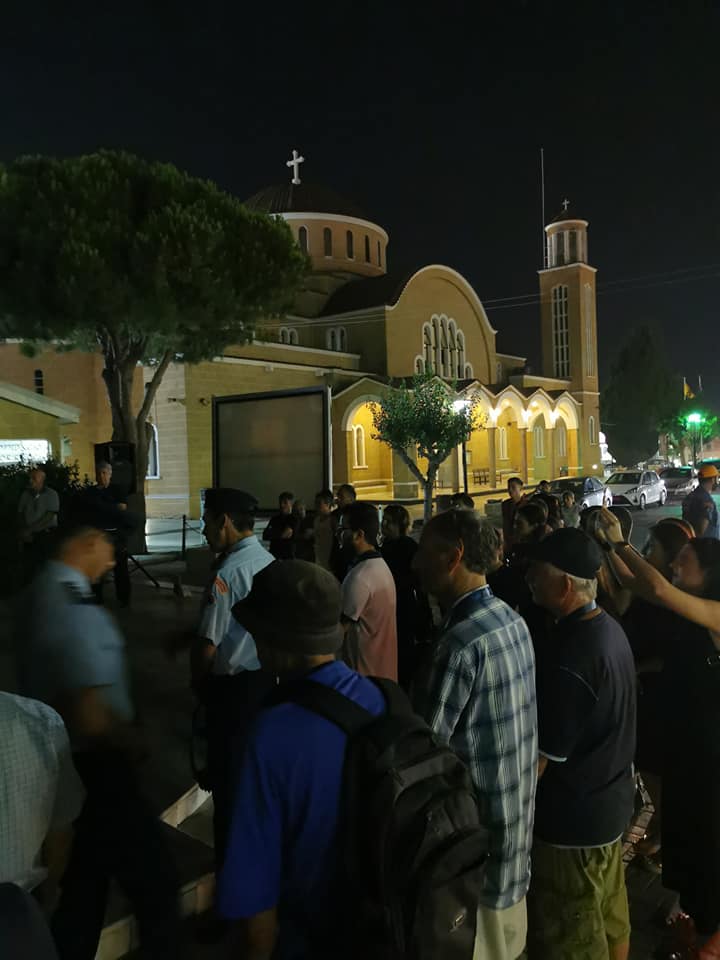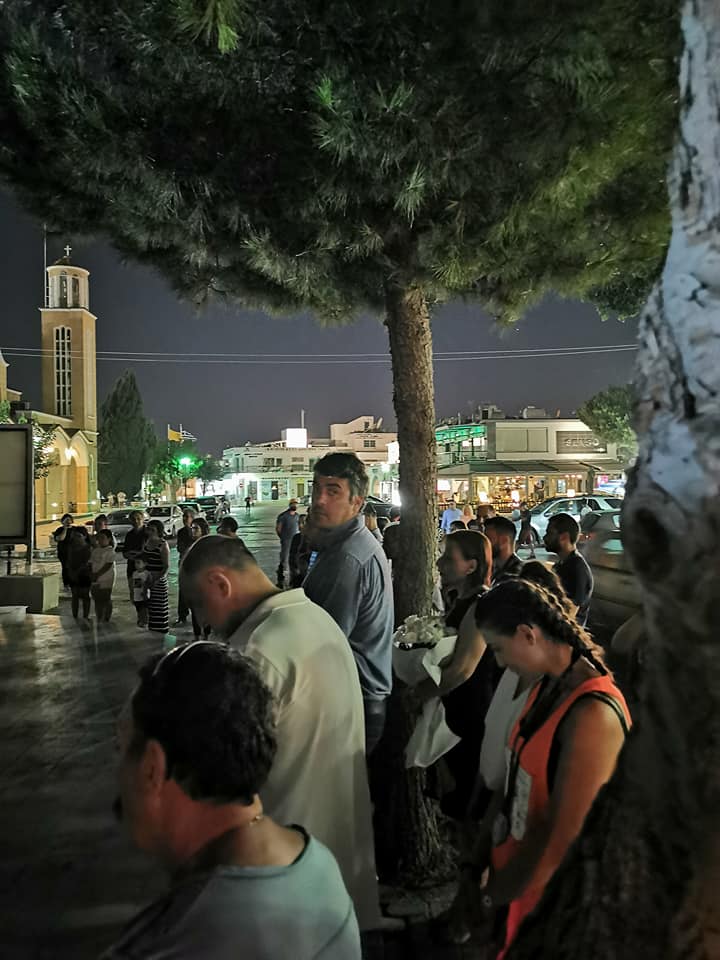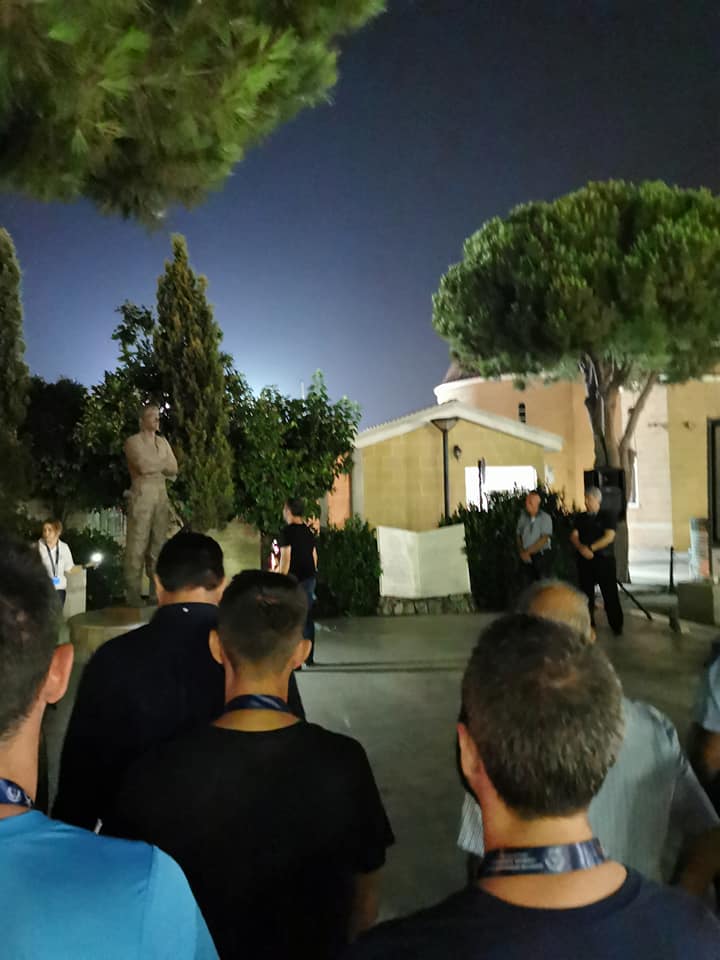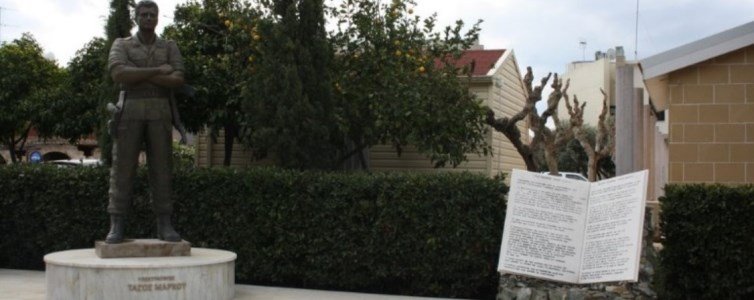With feelings of debt and honor, organized ensembles of our province, honored yesterday the lakeside hero Tassos Markou, with the established street race.
Dozens of our fellow citizens took part, ending up in front of a statue of the hero in Agios Georgios Square, where a trishagio was laid and wreaths were laid.
The event was organized by SEK and was under the auspices of the Municipality of Paralimni.



Lieutenant General Tassos Markou from Paralimni - History
The legendary fighter Tassos Markou was always present in all the critical hours that our country went through and took on a leading role, always fighting on the front line. Today, the story of the brilliant protagonist shocks even the most indifferent.
Tassos Markou was born in the town of Paralimni on September 18, 1936. He was the first child of Meli Markou and Maria Xiourou. Due to the financial difficulties and poverty that plagued the rural population of Cyprus at the time, the Markos family moved to Famagusta, where little Tasos learned his first letters at Agia Zoni Primary School and later at Agios Loukas Primary School.
In September 1948 he was admitted to the Hellenic High School of Famagusta after entrance examinations. His character then began to show the first signs of responsibility and philanthropy, friendship, appreciation for fellow human beings and humanity then became the rules of life for the teenager Tassos Markos.
The leventia of the soul then began to be accompanied by the leventia of the body. His performance in sports then began to be remarkable. He participated in the sports team of the Famagusta High School with which he took part in the 1953th Pancyprian Student Games in which he won the gold and silver medals in javelin and archery respectively. As a reward for his success, the teaching association of the Famagusta High School awarded him the "Kyriakidio" award for the year 1954-XNUMX.
After graduating from the High School of Famagusta, he went to Athens to attend the exams for the Evelpidon school, but due to a delay in his arrival he lost the exams and returned to Cyprus where he was hired as an employee of the company P.K. Panagidis in Famagusta.
In May 1955 and while the liberation struggle of Cyprus had begun, Tassos Markou joined the E.O.K.A. On December 18, 1955, the team in which he participated was seriously wounded by an ambush by two English officers. The information of the English leads Tassos Markou to be involved in the ambush and they are looking for him, but he manages after an anxious attempt to escape the arrest and to escape from the Organization on January 5, 1955 in Athens.
There, Tassos Markou managed to find a job and in this way to cover the costs of tuition and to prepare for his big dream that always remained his admission and study at the School of Guards, which he succeeded in the next entrance exams.
During this period, his mind was always on his homeland, which was fighting for Freedom, and his heart was pounding. For this reason, in November 1958, he secretly left the School of Guards and returned by plane to Cyprus via Paris. . Tassos Papadopoulos. Under the pseudonym "Gouras" he took over the administration of the Kythrea sector on the eve of Christmas 1958.
The assumption of the administration of the Kythrea sector and the presence of Tasos Markos in the area was then accompanied by the solution of the serious problems that existed due to the successes of the English at that time. Tassos Markou did not take long to gain the trust and appreciation of his competitors and to reorganize his sector by turning it into a militant part of the Organization.
The signing of the Zurich Agreement found Tassos Markou in his field. He had then expressed the view that the militants should be disciplined in the decisions of the political leadership in relation to the Agreements. In March 1959 the Struggle ended and the Fighters came down from the mountains and out of the hiding places.
On April 13, 1959, Tassos Markou left for Athens to continue his studies at the Evelpidon School. There he threw himself back into the quest for success in school lessons. In August 1959 he graduated from the school and took the honorary oath of the Greek Officer. With the rank of Lieutenant, he then served on the Greek-Bulgarian border.
Characteristic for his ethos and modesty was the answer he gave to Digenis when he had then asked him to send him a written report on his personal action in the Struggle for its summary in the memoirs of the Leader of E.O.K.A .: "What I did, Chief, was an obligation to my homeland. So I have nothing to say about myself. "
On November 16, 1961, at the invitation of the then President of the Republic of Cyprus, the late Archbishop Makarios III, he returned to Cyprus and on December 4, 1961, he joined the newly formed Cypriot Army with the rank of Captain. which he later had two children, Andri and Paris.
The Turkish Cypriot uprising of December 1963 finds Tassos Markou on the ramparts of the struggle for the defense of Nicosia. His contribution to the neutralization of the defensive positions of the Turks and the release of groups of national guards in the area of the Severis Flour Mill was important. In the spring of 1964, Tassos Markou was promoted with his men to the heights of Profitis Ilias in Pentadaktylos, creating a strong line of defense north of Nicosia. Remarkable was his effort to protect civilians among the Turkish Cypriots, a fact that proved once again his human character and his great appreciation for human life.
Following the end of hostilities, the Cypriot Government intensified its efforts to acquire modern weapons. The honesty and diamond character of Tassos Marcos contributed to the assignment to the young Captain of the missions to secure this armament from Lebanon, Egypt and Czechoslovakia.
On November 22, 1965, a team of Cypriot engineers and a large number of reservists for training in the Russian anti-aircraft missiles provided by the then Cypriot Government travel to Egypt. The responsibility for the smooth conduct of the training was then assigned to Captain Tassos Markou. The training of the Cypriot pilots was completed with great success in September 1966. However, the Russian missiles never reached Cyprus.
All of the above missions prove the confidence of the Cypriot Government in the face of the then young Captain who stemmed from his high administrative skills, excellent character and honesty. In November 1971, Tassos Markou was promoted to the rank of Major. . In the meantime, his feelings against the Greek junta and its affiliates in Cyprus are becoming more and more intense. The interception of a coup plot in February 1972 by Tassos Markou and a group of his colleagues and the promotion of this document to the Government of Cyprus contributed decisively to the annulment of the planned coup. In the spring of 1973 he was transferred to the 12th Tactical Group based in Kythrea where he assumes executive duties. There he pioneers the defense organization of the region and the preparation for repelling any hostile action.
The treacherous coup of July 15, 1974 finds Tassos Markou in Kythrea from where he leaves after permission for the Archdiocese where he organizes the defense of the Palace. With the outbreak of the Turkish Invasion on July 20, 1974, Major Tassos Markou organizes with a small number of reservists a defensive line in the area of the village of Hamit Mandres where paratroopers had been dropped by the Turkish invading forces. In the afternoon of the same day, Major Markou was put in charge of the neutralization forces of the Bekkiogi enclave. During the battle, Major Mark showed rare traits of heroism and self-sacrifice, and his contribution to the success of the offensive was crucial. On the evening of July 21, 1974, he led a force of about 100 men to the area of Dikomou, where he reinforced the defensive units of the 361st Infantry Division in the area, with the mission of stopping the advancing Turkish Invasive Forces.
On July 23, 1974, after the ceasefire agreement, Major Tassos Markou was assigned to set up the defensive line from Mia Milia to Koutsoventis. From the 23rd of July until the 29th of July 1974, it forms the 315th TP which consists of reservists and soldiers from disbanded units and builds fortifications and mines the area.
At the same time, the idea of overthrowing the coup d'état and restoring constitutional order with the expulsion of corrupt Greek officers and the control of the National Guard by democratic Cypriot officers is swirling in his mind. His objective was to create conditions for effective defense, even if conditions allowed a surprise strike and a counterattack to drive out the Turkish invasion forces. For reasons unknown until now, the move to overthrow the coup data was never manifested, perhaps due to the non-response of various factors which were approached by Major Markou at the time.
On the evening of July 30, 1974, he returned to his unit in the area of Mia Milias, disappointed but at the same time determined to stop the impending advance of the Turks towards the area of Famagusta. He creates new defensive positions, mans new outposts and asks the GEEF for reinforcements which are never sent to him. A new scene similar to the narrows of Thermopylae is set up in the area of Mia Milia - Koutsoventi. The modern Leonidas of Cypriot History organizes all day the defense of the region and at night plans his actions in case of an attack by the Turks and inspects the defensive works.
In the early hours of August 14, 1974, the tragedy of Cyprus began to unfold. The battalion of Tassos Markos is being ruthlessly bombarded by the Turkish air force. Tassos Markou asks the GEEF for support from the artillery units operating in the area and reinforcements for men and ammunition, but the GEEF's response never reached the heroic Major with his claws and teeth. Tassos Markou, seeing his abandonment by GEEF, decided to face the situation with the meager means he had. The battle was unequal but the hero Major and his men defended with stubbornness and bravery of the homeland.
Around 10:00 am the line of defense in the area was broken and the Turkish tanks had entered the road Nicosia - Famagusta. The drama began to end. In a last-ditch effort to repel the oncoming Turkish tanks by creating a new defensive line and ensuring the smooth folding of his men to avoid being cut off in the already catalyzed area, Major Markou moved north to the area of Kythrea with two of his men . A little later he ordered his two men to leave and he himself moved to the area of Kefalovrysso Kythreas. The last contact with Major Tassos Markou was made by radio by the Commander of the Kythrea Tactical Group on the afternoon of August 15, 1974. He has been missing ever since.
Major Tassos Markou, faithful to the oath of the Greek officer, remained immovable on the ramparts of the defense of his homeland, fought with unparalleled heroism, courage and self-sacrifice and is today the most heroic figure among the Greek Cypriot Officers. Special Glory and Honor belongs to the heroic and immortal - whether he lives missing or fell in the field of Honor - Major Tassos Markou. Such men and such officers were born in our little Cyprus.
The homeland, appreciating the greatness of his heroism and giving him the appropriate honor, promoted Tassos Markou to the rank of Lieutenant General on October 26, 2002. In honor of the Hero Officer, he named one of the largest camps of the National Guard, naming him the "Camp of Lieutenant General Tassos Markos". In Mitropoleos / Agios Georgios square there is a statue of Tassos Markos with rich photographic and historical material.
Famagusta.News
